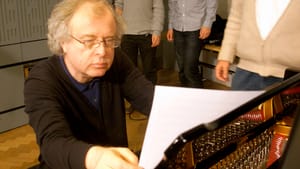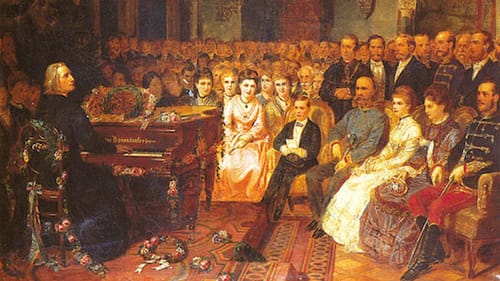Stay in the Loop
BSR publishes on a weekly schedule, with an email newsletter every Wednesday and Thursday morning. There’s no paywall, and subscribing is always free.
Extraordinary instruments
Princeton University Concerts presents Sir András Schiff, piano

Before Sir András Schiff appeared at Richardson Auditorium as part of the Princeton University Concerts series, a Bösendorfer 280VC concert grand piano commanded the stage like a Lamborghini at a car show. All eyes were drawn to this monolith, its presence demanding reverence, silence, and awe. This, it seemed to say, is no ordinary piano, program, or musician.
Princeton’s series is about to celebrate 125 years of bringing extraordinary musical talent to our region. Born in Hungary but now a British citizen, Schiff performs all too seldom on this side of the pond, and those who eagerly awaited this concert, sold out for months, were rewarded. Throughout the two-and-a-half-hour recital, hardly a head moved in the audience, as though listeners were transfixed en masse.
An unabashed specialist in 19th-century Central European piano repertoire, Schiff offered a program of Mendelssohn, Beethoven, Brahms, and Bach. What followed was a fusion of sensitive interpretation without gratuitous emotionalism in partnership with an instrument of unexpected power and tonal distinctiveness.
In a popular video, Schiff explains that he loves the Bösendorfer because it has three distinctive ranges: upper, middle, and bass. These are not necessarily smoothly connected. The infinitesimal rough edge between these ranges gives the Bösendorfer its bite, keeping its sound from becoming too pasteurized. This was immediately apparent in Mendelssohn’s Fantasie in F sharp minor, which shows the composer’s penchant for passionate expression as well as lighthearted charm.
Schiff and Beethoven
The second work on the program was Beethoven’s Piano Sonata No. 24, op. 78, in F-sharp major. The work flares with signature Beethoven effects, such as subito piano, where the music rushes at the listener, then stops abruptly to deliver a tender kiss appropriate for a work dedicated to one of the candidates for Immortal Beloved status, Therese von Brunsvik. Incidentally, Schiff’s justly famous lectures on the Beethoven sonatas are well worth hearing.
Before and after intermission, Schiff offered two sets of Brahms’s capriccios and intermezzos: the Op. 76 Piano Pieces and Op. 116 Fantasias. Despite their light-sounding titles, each of the 15 short works is a miracle of precision, character, and imagination.
As interpreted by Schiff, the eight Piano Pieces, alternately rhapsodic, jocular, and agitated, ran the gamut of human emotion without sinking to sentimentality, probably the chief flaw in weak performances of Brahms. The piano’s tone was large and warm; the pianist’s momentum was driven, yet open to reflection.

Dressed in black, but not in formal tuxedo, Schiff gave the impression of modesty and gentleness. Known for his fierce opposition to tyrannical governments, clearly this gentle demeanor rests on a backbone of steel.
Bowing to applause, hands clasped before him, the artist could be a monk; there is an otherworldly quality to his presence. When playing, he maintains a Mona Lisa smile, but his eyes are softly focused on an invisible space just past the keyboard. I wouldn’t be surprised to learn that he meditates, but then, great music is a meditation in which our focus is diverted from time and melts into moments at once fleeting and eternal.
Bach redefined
The program concluded with Bach’s English Suite No. 6 in D minor, which I have heard performed only on the harpsichord. For me, this was a revelation, revealing the structure and relentless animation of eight dance movements. Only Bach could take the gavottes of courtiers and spin them into the dance of the divine.
Musical purists have their point: it is good to hear Baroque music on instruments of its time. But for modern listeners, it is also both instructive and delightful to hear what the powerful instruments of our era can do with this timeless music. Of course, there is a huge leap in terms of dynamics, but the complexities of the piano and Schiff’s own delineations made the structure of each movement crystal clear, attaining a state of perfection only Bach’s counterpoint can achieve.
The program ended with a standing ovation and three encores, including the first movement to Bach’s Italian Concerto and two "Songs without Words" by Mendelssohn.
What, When, Where
Sir András Schiff, piano. Princeton University Concerts. Fantasie in F-sharp Minor, Op. 28, by Felix Mendelssohn; Piano Sonata No. 24 in F-sharp Major, Op. 78, by Ludwig van Beethoven; 8 Piano Pieces, Op. 76, and 7 Fantasias, Op. 116, by Johannes Brahms; English Suite No. 6 in D Minor, BWV 811, by Johann Sebastian Bach. March 29, 2018, at Princeton University's Richardson Auditorium, Alexander Hall, 68 Nassau Street, Princeton, New Jersey. (609) 258-2800 or princetonuniversityconcerts.org.
Sign up for our newsletter
All of the week's new articles, all in one place. Sign up for the free weekly BSR newsletters, and don't miss a conversation.

 Linda Holt
Linda Holt